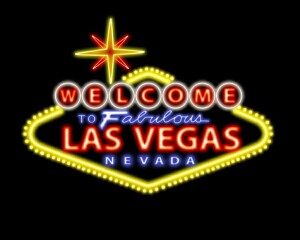
When one thinks of casinos, the images of �Fabulous Las Vegas� spring to mind, with James Bond sitting beside some bodacious babe playing baccarat in a white tuxedo while sipping a martini (�shaken, not stirred�).
The reality is that table games, such as baccarat, blackjack, or Pai Gow may make up a huge amount of a casino�s revenue stream, but by far, the bulk of every casino's profit is from its endless row of slot and Video Poker machines, the latter much more-so at the casinos referred to as the "locals" or "off-Strip" joints, rather than the tourist traps on The Strip where slot machines outnumber VP machines ten to one.
Wading towards the action through huge mega-casinos, such as Caesar�s Palace or The Rio, you'll pass by countless, mind-boggling intricate, often confoundingly confusing machine games. Everything from virtual �Wheel of Fortune� to slots with mind-warping hieroglyphs and 50 pay lines.
Naturally, all of these games have one prime concept in mind, one reason they exist: to take as much of your money as they can, offering you mindless random odds, over which you have no control.
Those mega-monster billion dollar hotel-casinos weren't built because their owners struck oil on the land. They were built on the backs of gamblers' losses. In every casino game, the house has a favorable edge. If that wasn't true, Las Vegas would still be nothing but dirt and heat. Casinos do everything they can (or that the law allows) to make gambling as pleasant and comfy as possible � they want you to spend your money, and, if you get lucky and win, to stay there and lose it all back.
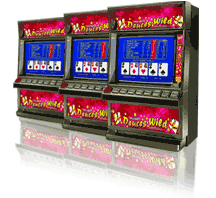
Be smart; play the games where you even out those odds, and, with enough knowledge of HOW to play, even tilt them in your favor. Don't play ANY casino game unless you know HOW to play it. The house already has the edge.. why give them even more by playing a game you don't understand?
Keeping that in mind, while you can�t beat the odds offered at the craps table (for example) with a slot machine, there is one machine-based game from which you can actually make a decent living, IF you know proper play.
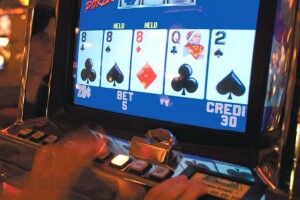
Imagine: a machine that, unlike slots, offers you the chance to make decisions (!) that affect the outcome of the game. In fact, it�s a game, for which using your mind to its full potential won't get you 86'd by the house. The catch is, you have to know the proper way of playing to maximize your wins. �What game?� you ask. Why, Video Poker, of course. VP is easily THE most popular game in the casino amongst the "locals." Tourists favor slot machines.
Learning the Game
First, let me interject that I simply love LDW Software's company name. The initials stand for "Last Day of Work."

I grin every time I think about it. In the past, I've reviewed their spectacular Fish Tycoon and Village Sim games.. one of their claims to fame is their "Sim" games, and they make some of the coolest ones around � thoughtfully programmed, wonderful graphics, compelling and relaxing, non-violent game play.
But back to the subject at hand.. Video Poker (VP), much like its live-action relative has countless variations, from its most basic �Jacks or Better� five card draw, to Texas Hold�em variants and even an extremely, mind-blowing, fifty-hands-at-once version. If you�re a VP neophyte, you�re going to want to start with something simple that has good paying odds.
Personally, I believe that the �Double-Double-Bonus� version of the game is, by far, the most interesting, as it offers a variety of tasty and lucrative mini-jackpots, besides the ever-elusive 40,000 to 1 odds King of jackpots: The Royal Flush, which is of course THE hand that you are always hoping to hit. Play VP long enough, and eventually, you WILL hit a Royal.
Of course, the real "juice" is playing VP for real in a real casino with real money. Simulators and teaching programs like this one serve their purpose � relaxation, and to help you learn proper game play.
VP is a game in which you MUST know the basics, or you may as well stick to mindless slot machines.
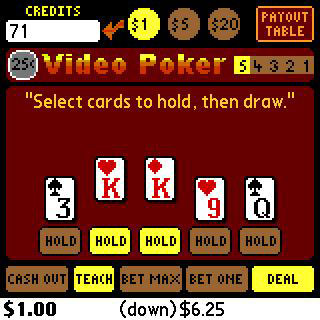
Now, if you want to learn how to �play to win�� that is to make the most money possible without taking huge risks.. without having to empty your wallet into the Big Vegas bank accounts, there is a way to do it with your Treo.
LDW�s ,�Video Poker Teacher� (VPT) a tiny (154 KB) program that, while small enough to easily reside in internal memory also lives just as happily on an SD card, is an amazing solution to learning the VP ropes on the cheap. Not only does it simulate a traditional �Jacks or Better� machine, but it gives you step-by-step advice and (much appreciated) moral support while playing it.
Go and try to find a real VP machine that tells you �I�m Sorry, Sir� when you lose a hand. You won't. Of course, no gorgeous cocktail waitress will saunter by when you're playing VPT.. hey, win some, lose some.
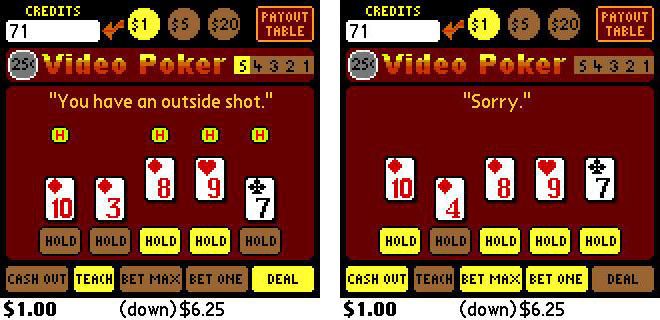
Unfortunately, VPT does not offer any of the more interesting VP varieties, such as "Bonus", "Double Bonus", �Double-Double Bonus� or �Triple Bonus�, or any of the wild card (�Deuces�, etc.) flavors of the game you'll find in almost every casino, which, if you ask any professional player are always going to be their preferred choices.
The only variant VPT offers is the basic, straight odds Jacks or Better, but this is enough to start wizening up your playing skills, or learning game-play basics if you've never played before.
Playing the Odds
The interface for VPT is simple and almost quaint. In fact, given what your Treo is capable of, it�s almost ugly. The program seems designed for older PalmOS devices, and doesn�t run in high-resolution mode, so the graphics are somewhat blocky and pixilated, and though this does not detract from the usability of the software, it does occasionally make for a bit of confusion.
I found that differentiating diamonds from hearts could be a bit difficult, and the �face cards� show only their corresponding letter, so don�t expect a true-to-life experience. In fact, it looks almost nothing like a real machine at all, which is sad because replicating the graphics of a genuine casino VP machine would, for a talented developer, be a snap with the Treo�s half-VGA display.
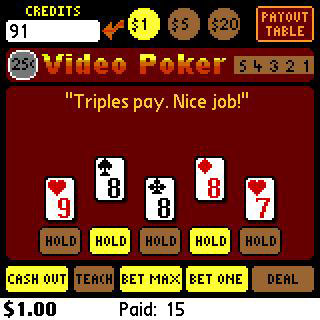
During the course of play, sound effects simulating those you�d hear in a casino are ever-present, though they too are un-spectacular. In any case, these will keep you company against the ever-present silence, which unlike a real casino, permeates in the background.
Otherwise, the game plays precisely as expected, seemingly with proper Vegas style odds to hit a hand, alongside a slightly altered traditional payout scale. You can pump as much virtual money as you want into the machine, so if you run out you can always re-load, without having to wait for Midnight to run your ATM card again. Ever been in a real casino and seen people hanging around ATM machines waiting for Midnight so they can draw out more cash because they already blew their wad for that day? I have. Plenty of times.. it's both funny and sad at the same time.
LDW's game also keeps track of your record for wins and losses, and displays your net balance (e.g. down $37.50). You can reset your balance (standing) at any time in the program�s preferences, along with enabling or disabling the sounds, teaching mode and the �attract mode�. The function for the latter is completely undocumented and I�ve yet to conclude precisely what it does as LDW provides only a simple read-me text file with this app and no other documentation (e.g. a user guide) seems to be available on their website. At least, I couldn't find any.
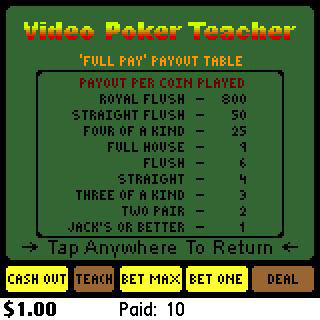
In the menus you may also change the denomination of each coin (called a credit) from a choice of 25 cents, $1.00, or $5.00 each and just like a real VP machine, you can play anything from one to five credits at a time. In VP lingo, playing five coins or credits at a time is known as "full (or max) coins in." Seeing as how we�re learning the game for free, there�s no reason to play less than the max. (Again, just as in real life.)
Actually, the game does not properly simulates the payout scale of a Jacks or Better machine, as it gives the same value for one credit as it does for five, meaning that if you play one credit you get the same odds for each that you would if you played five credits.
While this would be nice in real life, the truth is that if you play one credit in a real VP machine, your odds are much lower than if you played five. The clincher is of course, the Royal Flush, which is the uber-hand-to-hit. In a real VP machine, one credit pays you 250-to-1, where as two credits pays 500-to-1, three 750-to-1, four 1000-to-1 and five 4000-to-1. Did you notice the gap from four to five credits?
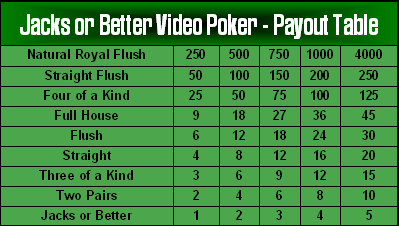
That�s correct folks, in Vegas, you have to play five coins at a time to get the best odds, whereas in VPT, you get the same pay scale for one coin as five, which does not correctly simulate the proper pay tables at all. Thus, it is best to run VPT in 5-coin mode, which is what you�ll be doing when you sit down at the real thing on your next trip to the casino, that is, after you learn tricks of the trade. Unlike mindless slot play, where you just pump in coins and pull the handle, you HAVE to use your brain to play VP.
You also have to be prepared to lose your entire bankroll when you walk through those casino doors. VP is a game of thinking, but it's also a game of chance. While I've played tens of thousands of hands of VP on many Las Vegas jaunts, (when you get good at the game and know when to hold'em and when to fold'em, a seasoned VP player can play 600 hands an hour!).. and had my share of losses, (followed by the requisite cursing and sorrowful weeping).. I swear I'm not making this up � on one occasion, I sat down at a $1.00 Bonus machine, and on my FIRST $5.00 ("full coins in") hand, hit a Royal Flush and was "hand paid" $4000.00 in cash.
No, I'm not a "professional" VP player � if I was, I'd be at a casino gambling, not writing this review.. but when I walk into a casino, VP is my game of choice. It can be both a total rush when you're winning, and a cold hard mistress when you're losing.
Training Wheels
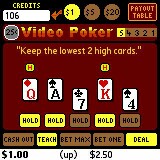
What sets LDW's VPT apart from the other numerous VP apps that you can run on your Treo is that it, unlike most of its cousins, offers you advice as you play, generally helping you to avoid making critical mistakes and coaching you as you learn which choices are the most profitable. At any time you can reach down and tap the �Teach� button for advice on what to do in a hand, and if you�re about to make a choice that is detrimental to good play, VPT warns you, highlighting the error and explaining what the best course of action actually is.
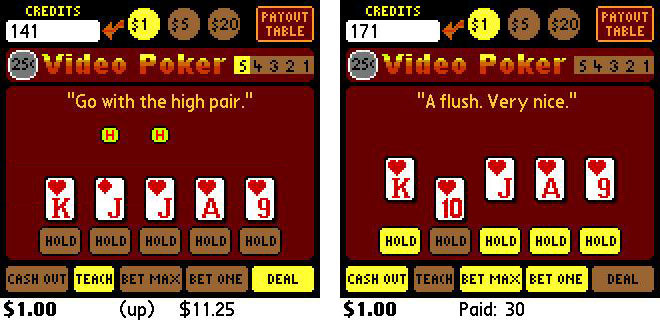
Naturally, you may not always agree with VPT's suggestions. In fact, there have been several occasions where the advice is blatantly bad (in my opinion), or overly conservative.
For example, the program tells you that when holding a pair of jacks and four to a flush, to keep the pair of jacks, whereas almost any seasoned human VP player will tell you to play the four-flush, as the jacks, while a made hand pay only 1-to-1 (you break even) and the flush pays 30-to-1. You have about a 20% chance to hit the flush, which is one in five to improve from a break-even situation to tidy profit, so this is always the better choice.
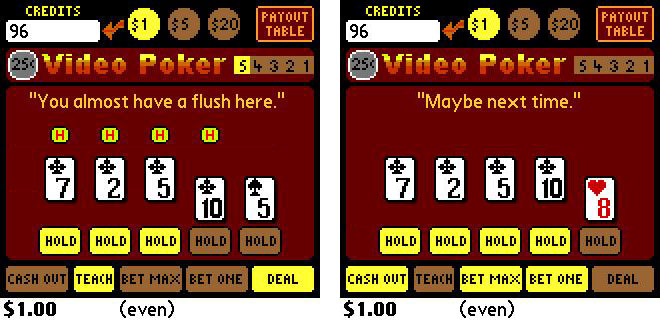
You can always turn the tutor mode, called �Passive Learning� off if you wish, once you�ve mastered the methodology and play, without the game giving you advice on a hand-per-hand basis, in the preferences screen. In any event, even if you leave the teaching mode on, you are always free to make up your own mind in the end, as if you make the same action twice, and despite the scolding you just received, your play is accepted and the hand proceeds normally.
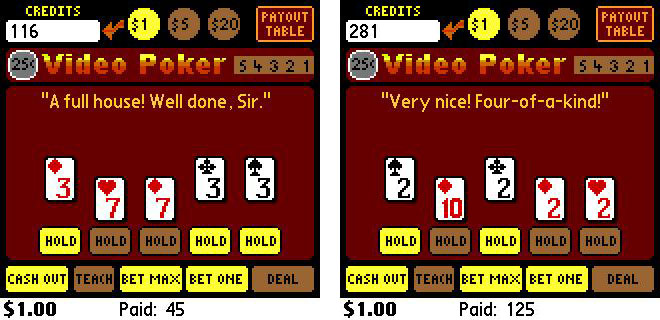
Conclusion >>
Copyright 1999-2016 TreoCentral. All rights reserved :
Terms of Use : Privacy Policy
TREO and TreoCentral are trademarks or registered trademarks of palm, Inc. in the United States and other countries;
the TreoCentral mark and domain name are used under license from palm, Inc.
The views expressed on this website are solely those of the proprietor, or
contributors to the site, and do not necessarily reflect the views of palm, Inc.
Read Merciful by Casey Adolfsson












